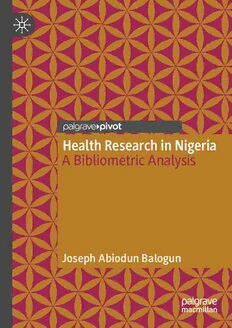Table Of ContentHealth Research in Nigeria
A Bibliometric Analysis
Joseph Abiodun Balogun
Health Research in Nigeria
Joseph Abiodun Balogun
Health Research
in Nigeria
A Bibliometric Analysis
Joseph Abiodun Balogun
Chicago State University
Chicago, IL, USA
ISBN 978-981-19-7096-2 ISBN 978-981-19-7097-9 (eBook)
https://doi.org/10.1007/978-981-19-7097-9
© The Editor(s) (if applicable) and The Author(s), under exclusive licence to Springer
Nature Singapore Pte Ltd. 2023
This work is subject to copyright. All rights are solely and exclusively licensed by the
Publisher, whether the whole or part of the material is concerned, specifically the rights of
translation, reprinting, reuse of illustrations, recitation, broadcasting, reproduction on
microfilms or in any other physical way, and transmission or information storage and retrieval,
electronic adaptation, computer software, or by similar or dissimilar methodology now
known or hereafter developed.
The use of general descriptive names, registered names, trademarks, service marks, etc. in this
publication does not imply, even in the absence of a specific statement, that such names are
exempt from the relevant protective laws and regulations and therefore free for general use.
The publisher, the authors, and the editors are safe to assume that the advice and information
in this book are believed to be true and accurate at the date of publication. Neither the
publisher nor the authors or the editors give a warranty, expressed or implied, with respect to
the material contained herein or for any errors or omissions that may have been made. The
publisher remains neutral with regard to jurisdictional claims in published maps and
institutional affiliations.
This Palgrave Macmillan imprint is published by the registered company Springer Nature
Singapore Pte Ltd.
The registered company address is: 152 Beach Road, #21- 01/04 Gateway East, Singapore
189721, Singapore
I dedicate this book to all academics in the Nigerian university system, for
working under challenging conditions and continuing to keep the faith.
P
reface
Around the world, to gauge academic “excellence” and “scientific impact,”
bibliometrics is now commonly used. This publication is a follow-up to the
six books I published on the Nigerian education and health systems. They
explore the evolution of healthcare education and the professionalization
milestones of the major health disciplines in Nigeria, including interdisci-
plinary healthcare practice, economic restructuring, and the pathway to
universal and quality healthcare in Nigeria. My previous books chronicle
the life history and service contributions of 35 pioneer Nigerian healthcare
professionals, 19 avant-garde academics, and 17 accomplished Nigerian
health sciences professors employed in foreign universities. Their career
trajectory exemplified the evolutionary phases of healthcare practice in
Nigeria from the nineteenth to the early twenty-first centuries. However,
there is currently a dearth of quantitative evidence on the research output
and scientific impact of the scholarship of Nigerian health sciences aca-
demics in the homeland and diaspora. This project sets out to fill this
knowledge gap in the literature. I brought to bear in writing this book my
extensive academic and professional experiences in Nigeria and the
United States.
This book is the first authentic source of information on the bibliomet-
rics of Nigeria’s health sciences frontline academics in the homeland and
diaspora. It discusses the fundamentals of bibliometrics, potential misuse
and abuses, and controversies on using the H-index to assess research
output and scientific impact. The book also provides a thematic evaluation
of the characteristics and trends of bibliometric articles emanating from
Nigeria between 1974 and 2021. Furthermore, this seminal publication
ix
x PREFACE
offers an original and unique contribution to desirable changes in evaluat-
ing the scholarship performance of Nigerian academics and strategies
toward improving current research systems in the country.
The book presents unique and vital information currently unobtainable
anywhere that can inform national and institutions’ research policies. The
comparisons made in Chap. 7 are enlightening as the metric information
is strongly required for policy and decision-making within Nigeria and
beyond. The findings in the book set the agenda for similar research cov-
ering other disciplines beyond the health sciences and other academic cad-
res (apart from professors). The book will interest a wide readership,
including government policymakers, postgraduate students, bibliometrics
and health sciences lecturers, research funding organizations, and health
researchers who may wish to collaborate with the profiled scientists. This
book uses the terms scientists, scholars, lecturers, faculty, and academics
interchangeably. Also, frontline academics refer to full professors in Nigeria
and foreign universities or the Nigerian Academy of Science health sci-
ences fellows.
Chicago, IL Joseph Abiodun Balogun
a
cknowledgments
I want to express my most profound appreciation Ms. Efe Mamuzo for
obtaining the bibliometric information from the Scopus database for all
the study participants. I am grateful to Mr. Isaiah Oyewole for entering
the bibliometric data into the SPSS® software. Also, I am indebted to
Professor Adetoyeje Oyeyemi for obtaining approval from the Institutional
Review Board at the University of Maiduguri to conduct the research
investigation presented in this book.
I am beholden to my brothers-in-law, Admiral Bamidele Daji and
Admiral Olumuyiwa Olotu, and sister-in-law, Dr. Feyisayo Daji, for pro-
viding transportation and security protection during my many visits to
Nigeria.
Several obstacles arose in trying to get this work published. Two pub-
lishing firms appreciated the scholarship behind this project but felt it
“was perhaps too niche and commercially unviable.” Indeed, the experi-
ence taught me lessons in persistence and advocacy. I applaud Kristina
Abbotts, who never lost faith in this work but was constrained from bring-
ing it to fruition by her organization’s profit margin consideration. I am
indebted to Marion Duval, editor for Health, Science, and Technology
Studies at Palgrave Macmillan, for her interest in this unique project and
for meticulously shepherding it to completion. Marion, you are such a
pro, and it is a delight collaborating with you! Last but not least, I
xi
xii ACKNOwLEDGMENTS
sincerely thank Mary Amala Divya Suresh, project coordinator at Palgrave
Macmillan, for working hard to meet the production deadline.
Tinley Park, IL, USA Joseph Abiodun Balogun

